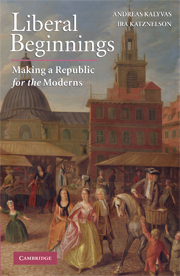Book contents
- Frontmatter
- Contents
- Acknowledgments
- 1 Beginnings
- 2 The Rhetoric of the Market: Adam Smith on Recognition, Speech, and Exchange
- 3 Agonistic Liberalism: Adam Ferguson on Modern Commercial Society and the Limits of Classical Republicanism
- 4 After the King: Thomas Paine's and James Madison's Institutional Liberalism
- 5 Embracing Liberalism: Germaine de Staël's Farewell to Republicanism
- 6 On the Liberty of the Moderns: Benjamin Constant and the Discovery of an Immanent Liberalism
- 7 After Republicanism: A Coda
- Index
- References
2 - The Rhetoric of the Market: Adam Smith on Recognition, Speech, and Exchange
Published online by Cambridge University Press: 05 September 2012
- Frontmatter
- Contents
- Acknowledgments
- 1 Beginnings
- 2 The Rhetoric of the Market: Adam Smith on Recognition, Speech, and Exchange
- 3 Agonistic Liberalism: Adam Ferguson on Modern Commercial Society and the Limits of Classical Republicanism
- 4 After the King: Thomas Paine's and James Madison's Institutional Liberalism
- 5 Embracing Liberalism: Germaine de Staël's Farewell to Republicanism
- 6 On the Liberty of the Moderns: Benjamin Constant and the Discovery of an Immanent Liberalism
- 7 After Republicanism: A Coda
- Index
- References
Summary
Who can claim Adam Smith? For some strands of political thought, the stakes are high. His writings have long been considered foundational texts for the economic dimensions of modern liberalism. An alternative understanding, perforce, would compel a reevaluation of liberalism's canonical beginnings. Such a challenge, in fact, has been fashioned by thoughtful readers who associate Smith, alongside his colleagues in the Scottish Enlightenment, rather more with the republican tradition of civic humanism. His rejection of the state of nature and his critique of social contract theory, as well as his denial that isolated individuals are the irreducible unit of social action, and his strong account of history and society as having moved through stages rather than having emerged out of a consensual founding, offer warrants for this effort to identify Smith as a “civic moralist.” Leaning heavily on Smith's Moral Sentiments, this ambitious reappraisal stresses the elements of sociality, sympathy, moral character, and passions to show the persistence and continued relevance of republican ideals for modern times.
Such readings are strained. Though rich with suggestive understanding, and often highlighting features that more-standard considerations of Smith either neglect or override, they nonetheless face overwhelming textual evidence that makes it impossible to simply appropriate him for a nonliberal tradition. Accordingly, the leading practitioners of the ‘republican’ construal regularly acknowledge that Smith's writings are hybrids, combining elements from more than one legal and political discourse.
- Type
- Chapter
- Information
- Liberal BeginningsMaking a Republic for the Moderns, pp. 18 - 50Publisher: Cambridge University PressPrint publication year: 2008



